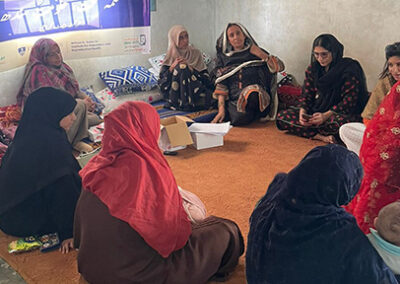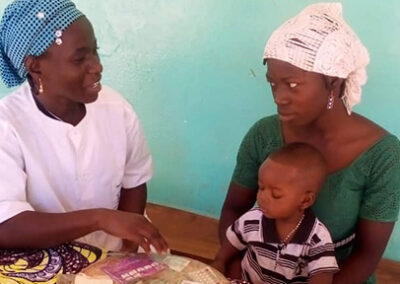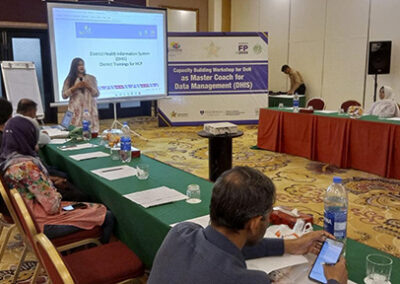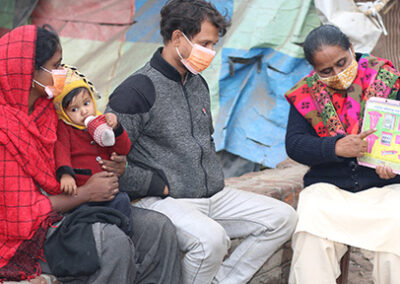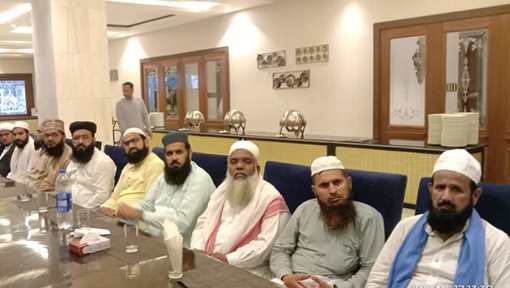
Religious scholars in Gujranwala hear about scaling up family planning services at the grassroots level.
Despite efforts to widely promote knowledge and awareness of family planning (FP), Pakistani men and women still consider it a sensitive topic and are reluctant to discuss sexual and reproductive health issues with skilled healthcare providers. The situation is particularly pronounced in a male-dominated society like Pakistan, where men hold decision-making power over many aspects of family life – from household finances to intimate marital relationships.
Many Pakistani men have been influenced by myths and misconceptions about family planning, which may also be reinforced in religious sermons from their local prayer leaders. Prayer leaders are respected in the community as knowledgeable sources for advice on domestic issues and private affairs, such as sexual and reproductive health. Because of their revered position, religious leaders play a pivotal role in influencing people in their day-to-day affairs, including marital relationships.
To support efforts to provide accurate information on sensitive family planning and child birth spacing issues, the country’s Population Welfare Department (PWD) engaged religious leaders as a critical element in its strategy to create an enabling environment and generate demand for family planning. The engagement of religious leaders is part of the National Action Plan to improve and accelerate population planning, developed in consultation with all provincial governments and stakeholders. However, inadequate funds and a lack of focus presented a challenge when implementing this strategy.
The Challenge Initiative (TCI) began supporting the local government in Gujranwala – the fifth most populous district of Pakistan with a population of about 5 million people – in June 2022. The district is considered conservative with religious leaders from all sects influencing the masses. At the request of the District Population Welfare Officer (DPWO), TCI worked with the Health and Population Welfare departments to engage prominent religious leaders (imams) to spread positive messages related to child birth spacing and family planning at the grassroots level in every mosque.
In Gujranwala, the PWD recently held an advocacy session on family planning with more than 30 religious leaders from all sects. District Population Welfare Officer, Adnan Ashraf, highlighted the seriousness of the population explosion and urged action, saying:
We as a society are going through social, economic and development challenges, which will further complicate the future with excessive population growth. I urge the religious scholars and imams to discuss this issue and provide information (on family planning and child birth spacing) through platforms like Friday Prayers and other religious seminars and make it a regular part of religious sermons.”
The religious leaders attending the session contributed positively and enthusiastically to the discussion in light of Islamic laws when considering the impact modern family planning methods have on improving maternal and child health. One of the master trainers and religious scholar, Muhammad Ashraf, shared:
Islam lays great stress on the health and wellbeing of the mother and child. The gap between the births of children contributes significantly to the optimal health of mother and child and the development of future generations. Women’s opinions should be highly valued in this regard (family planning).”
Another religious scholar, Maulana Jawad Qasmi, endorsed the need for family planning to match resources:
This is … a time to create a balance between the available resources and population. Scarcity of resources will result in scarcity of choices and economic growth.”
A prayer leader, Hafiz Gulfam, further noted:
Religious scholars are considered a key pillar in an Islamic society, so they should contribute to society’s development. Creating awareness for adopting FP methods is an important area where religious leaders can and should contribute.”
Religious leaders assured the district government of their cooperation in emphasizing family planning messages in their regular sermons. The PWD shared its plan to include local religious leaders in their on-ground activities and camps to limit religion-related inhibitions of the community.
Fiaz Ahmed Mohal, the Deputy Commissioner of Gujranwala, appreciated TCI’s efforts to help his district engage religious leaders. He expressed confidence that religious leaders would spread the message of responsible and conscious planning of families in their sermons to have a better educated, nourished and productive nation. Mr. Fiaz added:
I strongly believe that with persistent and informed efforts, we will overcome all the sorts of impediments in the form of misconceptions, administrative hurdles, etc., for sustained family planning in the country. Our religious scholars can play a pivotal role in this regard.”

